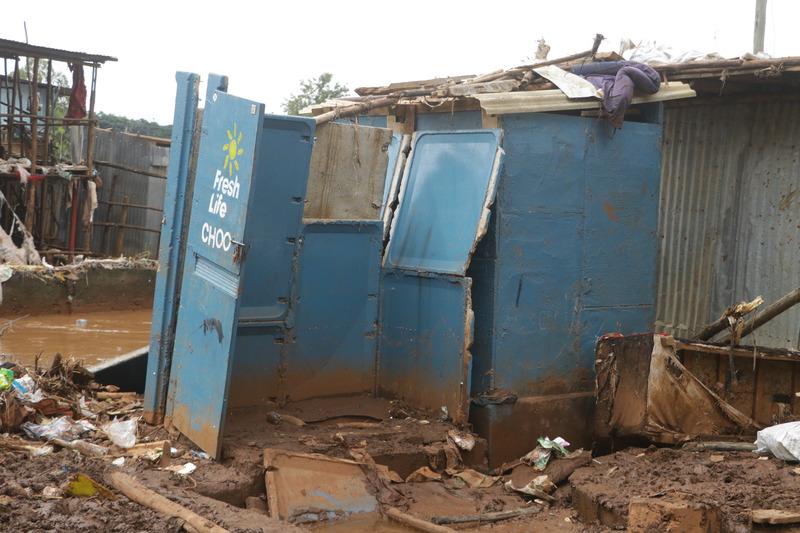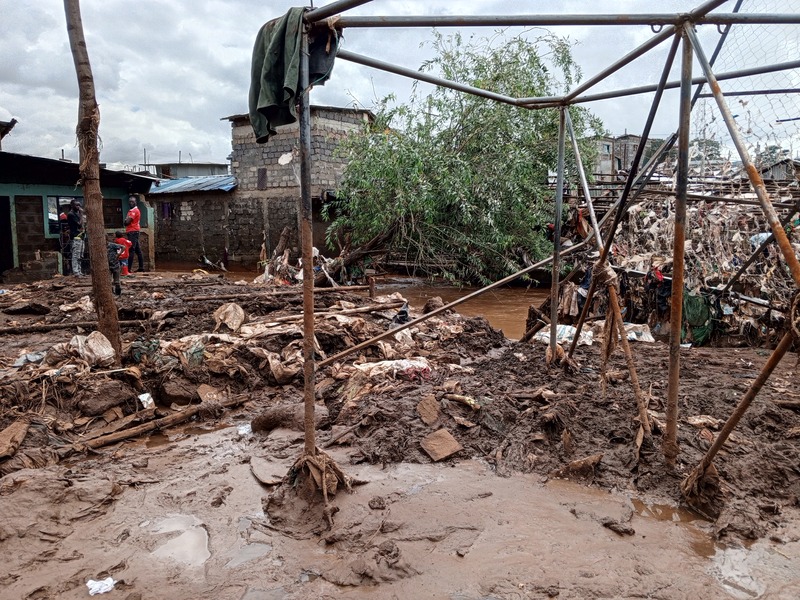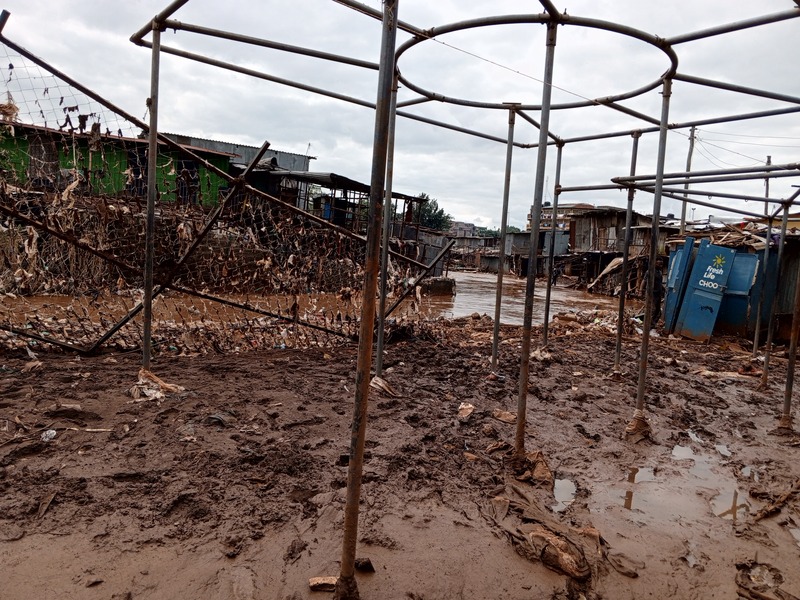Floods havoc: Cholera, diarrhoea cases spark concerns ahead of school reopening

For instance, Why Not Primary School in Mathare has reported that their toilets are submerged.
Education Cabinet Secretary Ezekiel Machogu on Thursday reported that nearly 98 per cent of schools are ready to commence the second term on Monday, May 13, after thorough assessments by the ministry revealed that the majority of educational facilities are in satisfactory condition.
In Nairobi, residents inhabiting riparian lands within the slums bore the brunt of floods, leading to many being displaced, while others faced eviction.
More To Read
- Ruto backs IMF partnership as key to Kenya’s debt, economic reforms
- Tough decisions stabilised the economy, saved Kenya from shame – Ruto
- Ruto and Oburu strengthen UDA-ODM alliance after by-election win
- Ruto unveils Sh400 billion mega dam plan to turn North and Coast regions into Kenya's new food basket
- Ruto says 15,000 jobs on the horizon following launch of landmark highway expansion
- Ruto says Kenya can attain first-world status within three decades
Mathare, one of the worst-hit areas, has witnessed a surge in cases of diarrhoea due to water scarcity, forcing locals to resort to consuming untreated water. The flooding has severely affected some schools in the Mathare slum, with infrastructure damage, including sunken toilets, posing significant challenges.
Many households in Mathare lack access to toilets, relying on public facilities, some of which were inundated by floodwaters. Residents have resorted to relieving themselves in the river posing more challenges.
For instance, Why Not Primary School in Mathare has reported that their toilets are submerged.
Paul Apiyo, a teacher at the school, reported significant losses for the school. "We lack toilet facilities for the learners which was destroyed by the floods, and the fence that blocked the river to protect the children has also been destroyed by the floods."
Apiyo said due to insufficient resources to address these urgent needs, learners may face challenges on Monday.
Speaking with The Eastleigh Voice, he also noted that some of the desks had been destroyed, along with the basketball pitch. Additionally, some members of the community were still living at the facility.
 Why not Primary School playground destroyed by floods. (Photo: Justine Ondieki)
Why not Primary School playground destroyed by floods. (Photo: Justine Ondieki)
Dr Alex Osiemo, speaking at a free medical camp organised by SHOFCO, highlighted a significant rise in diarrhoea cases among children and adults in Mathare. Over 150 patients exhibiting diarrhoea symptoms sought treatment at the facility.
Osiemo noted that waterborne diseases have become rampant in the area, prompting the distribution of medication and the implementation of measures such as the installation of Aqua Taps to mitigate the effects of diarrhoea.
"To address the surge in diarrhoea cases, six medical camps and wards have been set up in Mathare, operating daily alongside data collection efforts. The attendance at these camps varies, with a consistent surge, indicating the widespread impact of the crisis on the community," said Osiemo.
Dr. Osiemo noted that shared water resources and water scarcity as major contributors to the rise of diarrhoea cases in Mathare.
The World Health Organisation (WHO) has reported 34 cases of cholera in Tana River County, eastern Kenya, an area severely impacted by widespread flooding.
Stephen Jackson, the UN's resident coordinator in Kenya stated in an interview that efforts are underway to contain the diseases. "I believe that between government and national and international partners, we'll be able to contain it, we've contained cholera before, but it's a significant concern," said Jackson.
On Friday, the Ministry of Health issued a statement expressing grave concerns about the looming threat of a cholera outbreak, urging citizens to remain vigilant and take necessary precautions.
Public Health Principal Secretary Mary Muthoni highlighted the preventable nature of waterborne diseases such as cholera.
"Inadequate sanitation facilities, limited access to water and hygiene, and consumption of untreated water could exacerbate the situation in overcrowded rescue camps," said Muthoni.
She noted that the destruction of latrines has led to their collapse and filling with floodwater, thereby contaminating water sources with faecal matter. This poses a significant risk, especially in overcrowded rescue camps.
"Cholera is often linked to unhygienic conditions, a significant worry for those already struggling with displacement," said Muthoni.
 Why not Primary School playground destroyed by floods. (Photo: Justine Ondieki)
Why not Primary School playground destroyed by floods. (Photo: Justine Ondieki)
She highlighted contaminated water sources as the primary cause of cholera transmission, compounded by poor sanitation practices in affected areas.
"If you are in an area without access to water, there is a risk of consuming unwashed food and eating without cleaning your hands. This can result in ingestion of faecal matter," said Muthoni.
Reconstruction of schools
Members of Parliament have emphasised the urgent need for the government to prioritise the reconstruction of schools, roads, and bridges damaged by floods before learners return for the second term.
Kabuchai MP Majimbo Kalasinga stressed the importance of providing emergency grants to constituencies for repairing damaged schools, especially focusing on reconstructing toilets for the well-being of learners and preventing further disasters after the rains.
Additionally, Kalasinga urged the government to prioritise the reconstruction of bridges swept away by floods, particularly to ensure the safety of day scholars.
In response to the postponement of school reopening, President William Ruto earlier directed the Ministry of Education to collaborate with the National Government Constituency Development Fund (NG-CDF) to finance the repair and rehabilitation of damaged school infrastructure.
Dagoretti North MP Beatrice Elachi called for assistance to procure school supplies, such as textbooks, to prevent students from dropping out due to the loss of learning materials. She emphasised the need to address sewer issues in flooded schools, where many toilets are unusable.
To ensure schools are prepared for the resumption of studies, Machogu urged the National Treasury to promptly release the promised Sh1 billion, as announced by President Ruto. This funding will be utilized to repair flood-damaged institutions and ensure that disrupted learning resumes without delay.
However, some schools in Tana River, Homa Bay, and Kisumu counties may not re-open on Monday as directed.
According to the CS, these areas continue to experience flood-related challenges and will require a lot more repairs before learning resumes.
"We are trying to look at other mechanisms on how learning can take place in the few schools which are less than 5 per cent and could be even less than 2 per cent of schools. We are still getting the names in seven specific counties. Some parts of Tana River, Homa Bay, Kisumu, and the other few parts of the country," said Machogu.
Top Stories Today















































